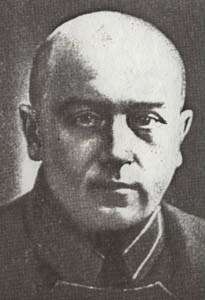Stanislav Messing

Stanislav Adamovich Messing (Russian: Станислав Адамович Мессинг) (1890, Warsaw, Russian Tsar Empire - September 2, 1937, Moscow, USSR) was a Soviet party and state leader, one of the leaders of the Soviet state security and intelligence bodies. Member of the Central Control Commission of the CPSU(b) in 1930-1934 years.[1][2]
Early years of his life
He was born into a Jewish family of a musician and a midwife (accoucheuse). Due to financial difficulties, he finished only four classes at the grammar school, after which he studied to become a locksmith. He first began working in a printing house.
In 1908, he joined the Social Democratic Party of Poland, where he met Felix Dzerzhinsky and Józef Unszlicht, who had given him patronage after the Great Revolution of 1917. He was arrested several times, he was imprisoned in the Warsaw Fortress and, in the same year, he was sentenced to administrative deportation to Belgium, where he earned his livelihood as an unskilled laborer at various enterprises. In 1911, Stanislav Messing returned to his homeland, he continued to participate in the activities of the Social Democratic Party of Poland. He was arrested again, but was soon released.
In 1913 he was drafted into the army and served in Turkestan as a common soldier of the 17th Turkestan Regiment, since 1914 this Regiment was replaced to the Caucasian Front. In 1917 he was elected a member of the regimental soldiers' committee.[1][2]
Career in Petrograd and Moscow
In the spring of 1917, during the Russian revolutions, he was in Moscow and participated in street unrest. Immediately after the Great revolution he was appointed secretary of the Sokolniki Executive Committee and chairman of the Sokolniki District Cheka. Since December 1918, Stanislav Messing was the head of the secret operations department of the Moscow Cheka. In July 1920, he was approved a member of the VChK Council. January 3, 1921, he was appointed chairman of the Moscow Cheka.[1] in November same year (1921) become chairman of Leningrad VChK then still called Petrograd[3]
Career in Petrograd
In November 1921, Felix Dzerzhinsky appointed Stanislav Messing as chairman of the Petrograd Cheka to strengthen the influence of power in this region. In this rank he was from 3 of November 1921 to 6 of February 1922. That time Petrograd was a capital of Russia until 1922, and from 1922 Moscow became the capital again.[1][2]
References
- 1 2 3 4 Мессинг Станислав Адамович | История повседневности
- 1 2 3 Беспощадная борьба с террором
- ↑ Sommer, Tomasz (2014). Anty-Polska Operacja NKWD 1937-1938 (in Polish). 3S MEDIA Sp. z o.o. p. 31. ISBN 978-83-61935-81-0.